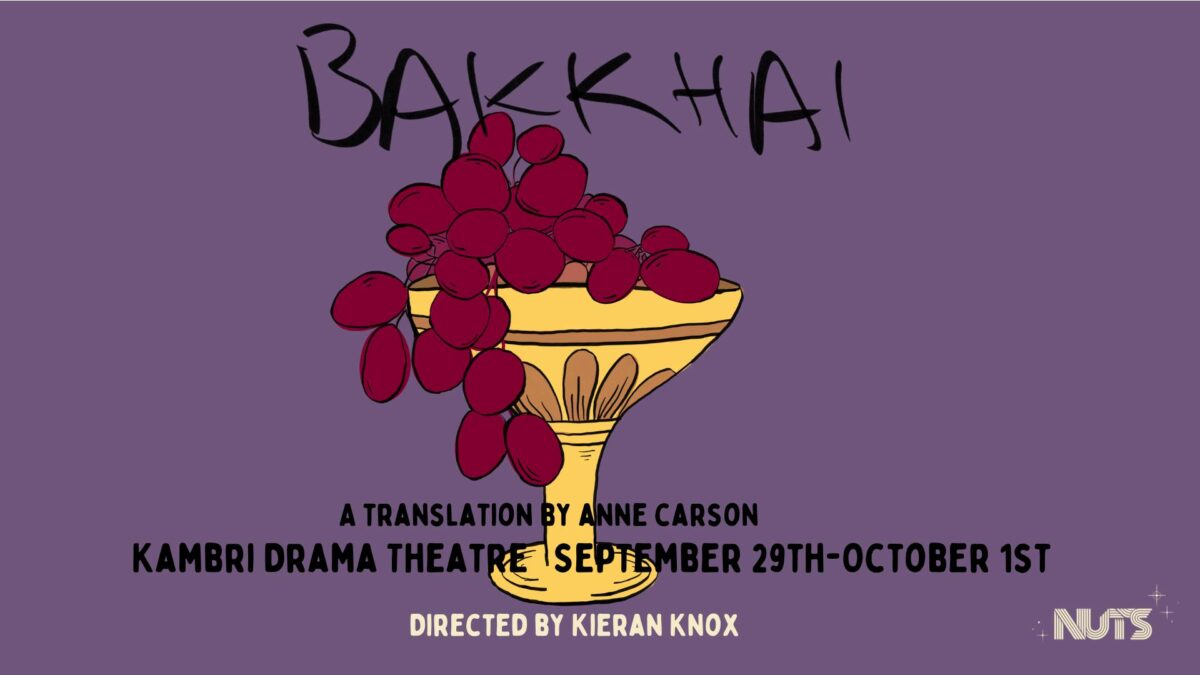I’m thinking it, you’re thinking it, let’s not mince words; Bakkhai is kind of a funny name for a play. But we needn’t be embarrassed to think so. Sitting down with director Kieran Knox just before opening night, the cast me-mi-ma-mo-mu-ing in the background, he told me it was precisely the funny spelling that initially drew him to the play. However, when he cracked it open, he found a sexy, blood-soaked gem and began a four-year odyssey culminating in the production we were about to see.
For context, Bakkhai is a modern translation by Anne Carson of a fifth-century BC Athenian play by Euripides. Maxine Eayrs (who plays Dionysus) cheekily described it as “the best thing since Homer”. The play centres on the coming of Dionysus, god of wine, theatre, and revelry, to Thebes, and her revenge against that city’s impious king Pentheus (Jamie Cardillo). All the while, the play weaves in a discussion of toxic pride, gender dynamics, and a queer narrative that became a central focus for NUTS’ rendition.
When discussing how the play was translated, both in language and production for a modern audience, Cardillo was visibly thrilled. Especially to talk about how the cast and crew explicitly worked to run their character Pentheus as a trans woman. And this decision makes for some great moments. After seeing Pentheus for who she is, Dionysus casually refers to the king of Thebes with she/her pronouns among her followers. This scene was an early delight, although the swapping of pronouns doesn’t always go down so smoothly. There are a few points late in the work where the decision caused some friction with the plot, but this was a small price to pay for what it added to other areas.
There’s a small scene near the midpoint where Dionysus dresses Pentheus in women’s clothes. In a different production, this might have been played for laughs – but because of the direction the cast took with it, it became the emotional centre of the production. Both Jamie and Maxine spoke about the importance of this moment. They also highlighted how their experience as trans people, and their memories of introduction into queer communities, helped shape the scene into a touching moment of self-realisation and mentorship.
Perhaps I shouldn’t have been surprised, given Bakkhai is about the god of theatre, but the blocking and set design render the play’s bloody antics in startling, visceral, and creative ways. In this fashion, Bakkhai punches well above the weight of a student production. While the abstract layout of the stage’s first iteration took time to wrap your head around, the lengthwise setup made Kambri Theatre feel bigger than any other production I’ve seen there. On the other hand, the post-interval stage setup, reminiscent of an amphitheatre, felt tense and claustrophobic – an excellent complement to the tragic finale. The choreography was also of exceptional quality, keeping a foot grounded in both storytelling and spectacle, and it didn’t spare an inch of theatre space. It is a credit to both the cast and Knox, the first BIPOC director NUTS has seen in years, whose inclusive and collaborative approach has been lauded by everyone I’ve spoken to. Overall, the production doesn’t just feel at home in Kambri Theatre; it feels like it was born and raised there.
Outside the physical set, Bakkhai is a tour de force for Jessica Luff’s now-famous lighting design. The gorgeous and dynamic setup for Dionysus’ opening monologue was a personal standout. And while the recorded sound was minimal, the chanting, stamping, and wailing of the cast members – both on and off stage – filled that space in an immediate and thrilling way. While perhaps not as tight as some other ANU productions, what the performances lacked in precision was often made up for in energy. With its poetic language and larger-than-life emotions, a play like Bakkhai is a tough ask for a performer. But when the cast lands the balance between subtlety and violence that the work requires, as they often but not uniformly did, the effect is spectacular. Outside of the duelling protagonists, standout performances included Darcy Hoyle’s Agave, whose blood-craved reverie was a joy to watch, and Marty Kelly’s Tiresias, who was an island of calm in a play that is anything but.
Finally, in speaking with Eayrs, I asked her to define what it meant to be Dionysian for her – and I’ll quote her in full:
“It’s something that is fake at its core, yet real in how it affects people. Its pure social construct – pure theatre. Theatre is a fake story, and nothing that’s happening on stage is really happening. And yet, at the end of the day, everyone goes home having learned something – or been affected in some way. It’s the pure social construct of pleasure and letting go that is, at once, completely empty but is made meaningful because of the emptiness it offers.”
Another word for emptiness is space. And I think that is at the core of this production, which is vacuous and sensational but creates space for its cast and crew to tell their stories and show off their experiences. Like the goddess herself, Bakkhai is all surface, which allowed this production to put its own heart into it.
Think your name would look good in print? Woroni is always open for submissions. Email write@woroni.com.au with a pitch or draft. You can find more info on submitting here.
We acknowledge the Ngunnawal and Ngambri people, who are the Traditional Custodians of the land on which Woroni, Woroni Radio and Woroni TV are created, edited, published, printed and distributed. We pay our respects to Elders past and present. We acknowledge that the name Woroni was taken from the Wadi Wadi Nation without permission, and we are striving to do better for future reconciliation.
